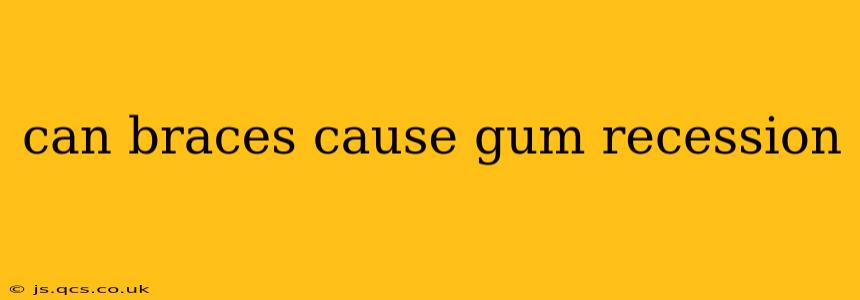Many people considering orthodontic treatment, like braces, wonder about potential side effects. One common concern is gum recession. While braces themselves don't directly cause gum recession, certain factors related to orthodontic treatment can increase the risk. This article explores the connection between braces and gum recession, addressing common questions and providing valuable insights into maintaining optimal oral health during and after orthodontic treatment.
What is Gum Recession?
Gum recession refers to the gradual pulling back of the gum line, exposing more of the tooth's root. This can lead to increased tooth sensitivity, potential root decay, and aesthetic concerns. It's a relatively common issue, and various factors contribute to its development.
Can Braces Directly Cause Gum Recession?
No, braces themselves don't directly cause gum recession. The brackets and wires don't inherently damage the gums. However, poor oral hygiene during orthodontic treatment can significantly increase the risk.
How Can Braces Indirectly Contribute to Gum Recession?
The indirect contribution of braces to gum recession stems from several factors:
-
Increased Plaque Accumulation: The complex structure of braces makes cleaning teeth more challenging. Food particles and plaque can easily get trapped around the brackets and wires, leading to inflammation (gingivitis) and, if left untreated, periodontitis (gum disease). Periodontitis is a major cause of gum recession.
-
Irritation from Brackets and Wires: The brackets and wires can sometimes irritate the gums, causing minor trauma. While typically not severe, this irritation can make the gums more susceptible to inflammation and recession if not properly managed.
-
Aggressive Brushing: Individuals may brush too aggressively in an attempt to clean around the braces thoroughly. This can damage the gum tissue, accelerating recession.
-
Improper Appliance Placement: While rare with qualified orthodontists, improper placement of orthodontic appliances can contribute to uneven pressure on the gums, increasing the risk of recession.
What are the Signs of Gum Recession?
Recognizing the signs of gum recession is crucial for early intervention. Look for:
- Longer-appearing teeth: The exposed root makes teeth appear longer.
- Sensitive teeth: Exposed tooth roots are more sensitive to hot, cold, or sweet stimuli.
- Notches or indentations in the gum line: These are visible signs of gum tissue loss.
- Bleeding gums: While bleeding gums can be a sign of gingivitis, it can also indicate more serious gum issues.
- Loose teeth: In advanced cases, gum recession can lead to tooth loosening.
How Can I Prevent Gum Recession While Wearing Braces?
Preventing gum recession during orthodontic treatment requires meticulous oral hygiene:
-
Proper brushing technique: Use a soft-bristled toothbrush and a gentle, circular motion to clean around the brackets and wires. Consider using an interdental brush or floss threader to clean between teeth and under the wires.
-
Regular flossing: Flossing is vital to remove plaque and food particles from hard-to-reach areas.
-
Using an antimicrobial mouthwash: An antimicrobial mouthwash can help reduce plaque and bacteria.
-
Regular dental checkups: Schedule regular checkups with your orthodontist and dentist for monitoring and professional cleaning.
Does Gum Recession from Braces Require Treatment?
If gum recession occurs, your dentist or periodontist will determine the best course of treatment, which may include:
- Scaling and root planing: This procedure removes plaque and tartar from below the gum line.
- Gum grafting: This surgical procedure involves replacing lost gum tissue.
- Other periodontal treatments: Various other treatments might be necessary depending on the severity of the recession.
Can I Reverse Gum Recession Caused by Braces?
While some minor gum recession might stabilize with improved oral hygiene, significant recession often requires professional intervention to prevent further damage. Reversing the damage entirely can be challenging, but treatment options can help prevent further loss and improve gum health.
Conclusion
While braces themselves do not directly cause gum recession, poor oral hygiene during treatment significantly increases the risk. By maintaining excellent oral hygiene, attending regular checkups, and following your orthodontist's instructions, you can greatly minimize the risk of gum recession and maintain healthy gums throughout your orthodontic journey. Remember to communicate any concerns about your gum health to your orthodontist or dentist promptly.
